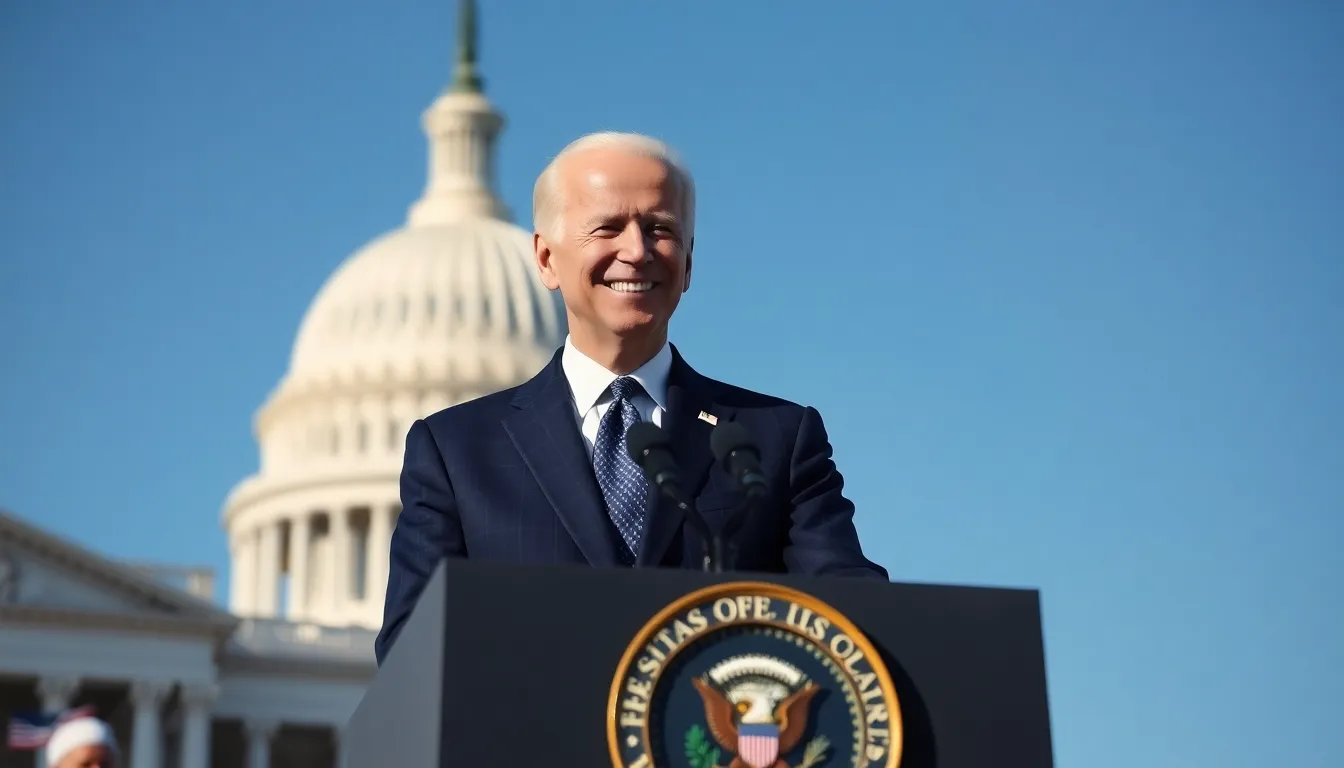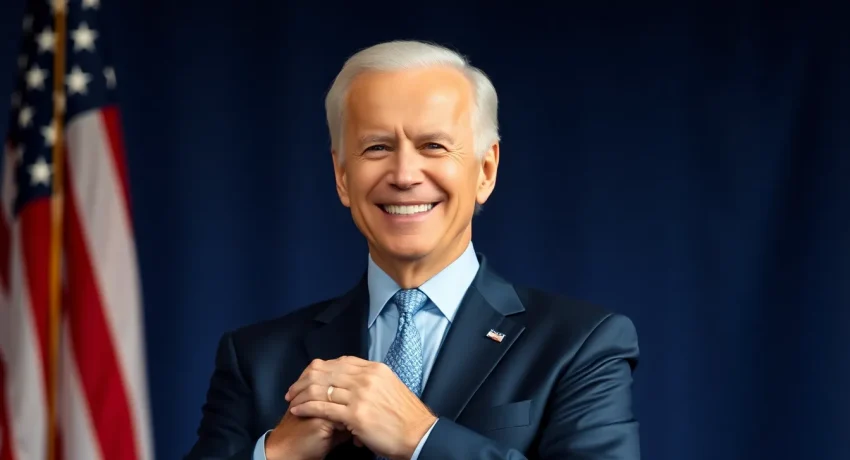In the whirlwind of American politics, the presidency from 2020 to 2024 was anything but dull. As the nation navigated a global pandemic, social movements, and economic challenges, one figure stood at the helm, steering the ship through stormy seas. It’s a tale filled with drama, debates, and perhaps a few too many tweets.
Table of Contents
ToggleOverview of the Presidential Term
This presidential term from 2020 to 2024 marked a significant chapter in American history. The presidency featured a range of pivotal events that shaped the nation’s direction.
Key Events and Milestones
The COVID-19 pandemic emerged as a primary challenge, capturing worldwide attention. Protests for social justice sparked across the nation, emphasizing calls for equality. The 2020 election itself became one of the most contentious in history, with high voter turnout. Additionally, the Capitol riot on January 6, 2021, represented a dramatic escalation in political tensions. Throughout this term, climate events and natural disasters also demanded urgent responses.
Major Policies Implemented
Health care policies adjusted to address the pandemic, with a focus on vaccine distribution. Economic relief packages rolled out to support individuals, businesses, and industries affected by lockdowns. Climate initiatives gained momentum, including rejoining the Paris Agreement. Infrastructure spending proposed significant investments to revitalize aging systems. Racial equity policies introduced frameworks aiming to reduce systemic inequality.
Profile of the President

During the presidential term from 2020 to 2024, this leader navigated one of the most challenging periods in modern American history. They faced a global pandemic, significant social movements, and pressing economic issues.
Background and Career
Joseph R. Biden Jr., born on November 20, 1942, in Scranton, Pennsylvania, served as Vice President from 2009 to 2017. He practiced law and represented Delaware in the U.S. Senate from 1973 to 2009. A seasoned politician, he developed expertise in foreign relations, criminal justice, and health care. Known for his empathetic approach, Biden prioritized issues affecting working-class families. Experience from previous administrations shaped his focus on rebuilding the economy and addressing climate change.
Electoral Victory and Inauguration
In the 2020 election, Biden secured 306 electoral votes against 232 for the incumbent president. His campaign emphasized unity and recovery amidst the pandemic and social unrest. Voter turnout reached historic levels, with over 159 million Americans casting ballots. On January 20, 2021, Biden took the oath of office, becoming the 46th president. Kamala Harris, his running mate, made history as the first woman, first Black, and first Asian American Vice President. Celebrations reflected hope for change and resilience during unprecedented times.
Domestic Impact
The domestic impact during the presidency from 2020 to 2024 was profound, affecting various aspects of American life.
Economic Changes
A series of significant economic changes emerged in response to the COVID-19 pandemic. Economic relief packages amounted to trillions of dollars, providing critical support to individuals and businesses. Policies aimed at stimulating job recovery focused on infrastructure investments, with plans allocating around $1.9 trillion for American Rescue Plan initiatives. Increased unemployment benefits temporarily helped millions while vaccination rollouts contributed to an economic rebound. Labor shortages catalyzed discussions about wages and worker rights, prompting a shift in priorities toward fair labor practices.
Social Issues Addressed
Social movements gained momentum during this period, driving conversations about racial equality and justice. Nationwide protests highlighted systemic racial inequality, with the administration emphasizing reforms in policing and criminal justice. Policies introduced sought to address historical injustices, encouraging dialogue around equity in communities. Initiatives aimed at supporting marginalized groups garnered attention, signaling a commitment to inclusivity. Additionally, LGBTQ+ rights received renewed focus, reaffirming the government’s role in protecting individual freedoms.
Foreign Relations
During the 2020 to 2024 presidency, foreign relations played a crucial role in shaping America’s global standing. The administration navigated several key international challenges and opportunities, balancing domestic priorities with the need for diplomatic engagement.
Key International Partnerships
The administration prioritized rebuilding alliances with NATO and strengthening partnerships in the Indo-Pacific region. Collaborative efforts with the European Union focused on countering climate change and advancing trade agreements. Engagement with countries like Japan and Australia emphasized security cooperation in response to regional tensions. Partnerships fostered by initiatives like the Quad increased dialogue on economic resilience and public health. These relationships highlighted a commitment to multilateralism, showcasing America’s intent to work collectively on global challenges.
Significant Diplomatic Efforts
Diplomatic efforts to rejoin the Paris Agreement marked a notable shift in approach to global climate issues. Engagement with Iran regarding the nuclear deal aimed to revive negotiations and restore international agreements. Notable discussions with Russia addressed cybersecurity threats and arms control frameworks. The administration prioritized addressing global health challenges, participating in initiatives for equitable vaccine distribution. These efforts underscored a commitment to diplomacy and international collaboration in a rapidly changing world.
Challenges Faced
The presidency from 2020 to 2024 encountered significant challenges that tested leadership and resilience.
Major Controversies
Controversies became defining elements of this presidential term. The handling of the COVID-19 pandemic sparked debate over public health measures and vaccine distribution. Misinformation spread rapidly on social media, complicating efforts for effective communication. Protests following high-profile incidents of racial injustice intensified discussions around policing and systemic racism. The Capitol riot on January 6, 2021, profoundly affected political discourse, leading to discussions on accountability and security. Policies proposed and enacted often faced backlash from both supporters and opposition groups, highlighting the polarized climate of American politics.
Response to Crises
Responses to crises characterized the administration’s actions. Early pandemic responses involved enacting emergency measures to bolster the healthcare system, including funding for vaccination efforts. Economic relief efforts materialized through the American Rescue Plan, which allocated approximately $1.9 trillion to support individuals and businesses during lockdowns. Recovery initiatives targeted infrastructure improvements and job creation. Social unrest prompted the administration to prioritize reforms in policing and racial equity. Throughout these challenges, the administration sought to rebuild public trust by emphasizing transparency and collaboration with state and local governments.
The presidency from 2020 to 2024 stands as a testament to resilience and adaptability in the face of unprecedented challenges. Under President Biden’s leadership, significant strides were made in addressing pressing social and economic issues while navigating a global pandemic. The administration’s focus on unity and recovery shaped policies aimed at fostering inclusivity and rebuilding trust among citizens.
As the nation moves forward, the lessons learned during this tumultuous period will undoubtedly influence future leadership and policy-making. The events of these years have left an indelible mark on American history, highlighting the importance of collaboration and commitment to progress in the pursuit of a more equitable society.




